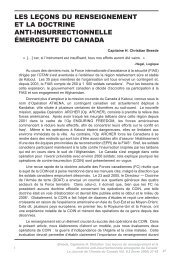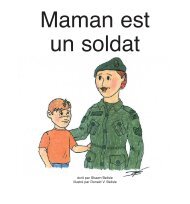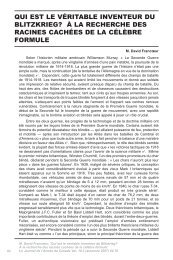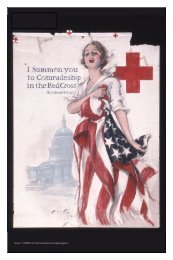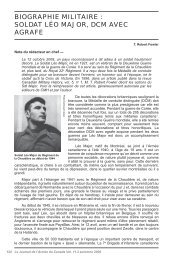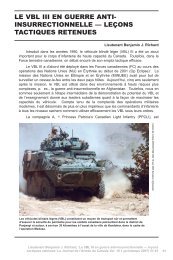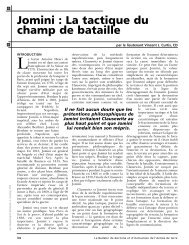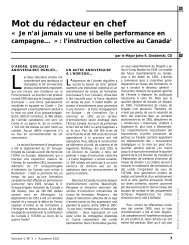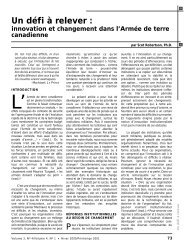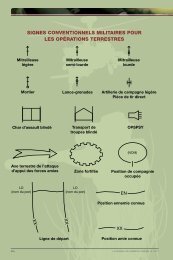The Canadian Army Journal
The Canadian Army Journal
The Canadian Army Journal
Create successful ePaper yourself
Turn your PDF publications into a flip-book with our unique Google optimized e-Paper software.
A HISTORY OF THE FRENCH WAR—ENDING IN THE<br />
CONQUEST OF CANADA<br />
JOHNSON, Rossiter. Pub: Heritage Books Inc.2007. (A facsimile reprint of the 1882 Edn)<br />
381 pages. ISBN: 978-0-7884-1464. $ 31.50 US<br />
Reviewed by Lt Col K W Kiddie, MA (CANTAB)<br />
A History of the French War—Ending in the<br />
Conquest of Canada is a fascinating book in that<br />
it is a modern reprint of an 1882 original<br />
publication, and as such does not conform to the<br />
current accepted layout of modern history<br />
publications. <strong>The</strong> chapters are preceded by a<br />
small synopsis of what is contained in each<br />
chapter, thereby aiding the reader as to what is<br />
placed where in the volume. Time lines are<br />
indicated by a superscript on each page giving<br />
the year of occurrence, which is a very helpful<br />
tool. What is a major contrast with today’s<br />
modern histories is that there are virtually no<br />
footnotes, no section of notes/ footnote<br />
explanation at the end of the volume and there is<br />
no bibliography. <strong>The</strong>re is a small but<br />
comprehensive index and there are very few (just<br />
three) pictures. <strong>The</strong>re is also no map included in<br />
the volume, which, given the large numbers of<br />
places described in the book, can cause some<br />
geographic confusion. However the book was<br />
written at a time when this was very much the<br />
style and would not have caused comment at the<br />
time. Another major difference from today’s<br />
publications is the absence of political correctness in the style of writing. For example<br />
the First Nation peoples throughout are called “Indians” and on occasions referred to as<br />
“the red man”. Other sections of society are referred to as peasants, settlers (etc) all of<br />
which jars slightly to our modern views, but were perfectly acceptable at the time of the<br />
original publication. <strong>The</strong>se minor aspects apart, this is an excellent insight into historical<br />
scholarship of the late 19th century.<br />
As to the content of the book itself, it is far more comprehensive than the title would<br />
indicate. When I first saw the title I assumed (erroneously) that the French War referred<br />
to was the “French and Indian War” or the “Seven Years War” and that it would be a<br />
discourse on the campaign in Canada culminating with Wolfe’s victory on the Plains of<br />
Abraham. I was pleasantly surprised to learn that the book covered the Anglo French<br />
rivalry and conflict from the earliest times charting the struggle from the initial colonists’<br />
claims in around 1500. In the event, about half of the book is dedicated to the earlier<br />
struggles, listed variously as King William’s War, Queen Anne’s War and King George’s<br />
War (this one known in Europe as the War of the Austrian Succession). <strong>The</strong>re are other<br />
chapters which deal with subjects such as the French expansion in to the West and the<br />
fate of the Acadians.<br />
It was this half of the book that I found really very interesting and informative,<br />
covering sectors of history which have been somewhat sidelined by the recent greater<br />
interest in the later French and Indian War. <strong>The</strong>re is a wealth of detail contained and<br />
<strong>Canadian</strong> <strong>Army</strong> <strong>Journal</strong> Vol. 11.1 Spring 2008 133


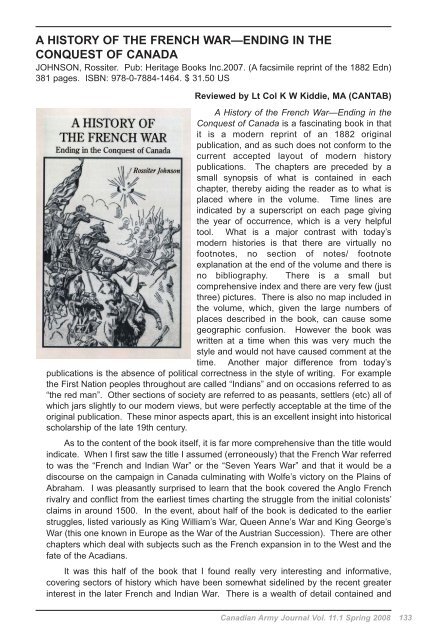
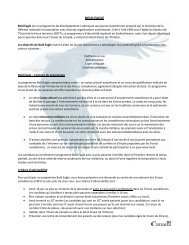
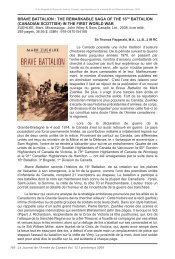
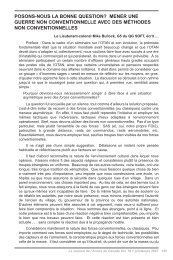

![La modularite dans l'Armee de terre canadienne [pdf 1.6 MB]](https://img.yumpu.com/17197737/1/188x260/la-modularite-dans-larmee-de-terre-canadienne-pdf-16-mb.jpg?quality=85)
